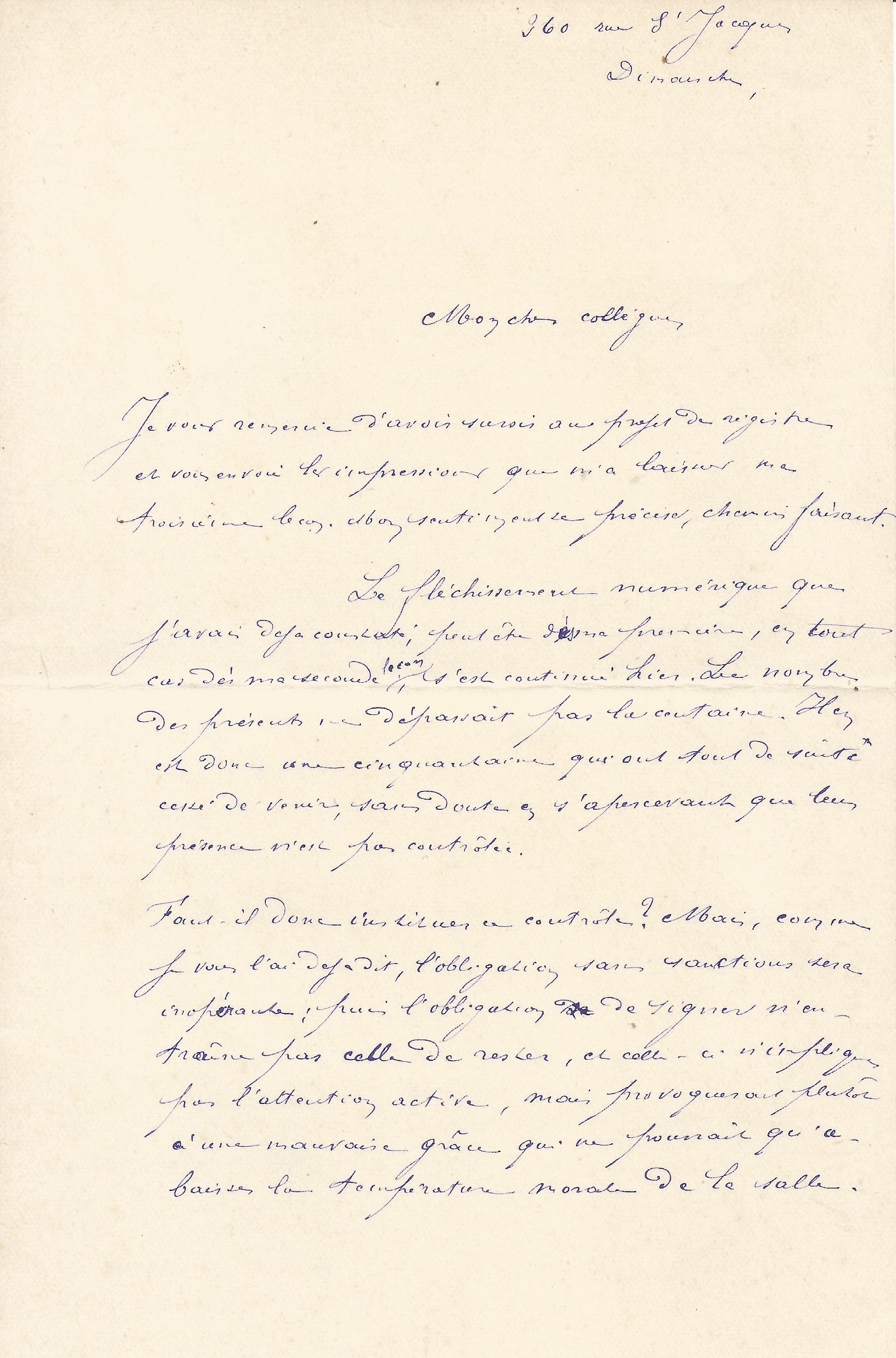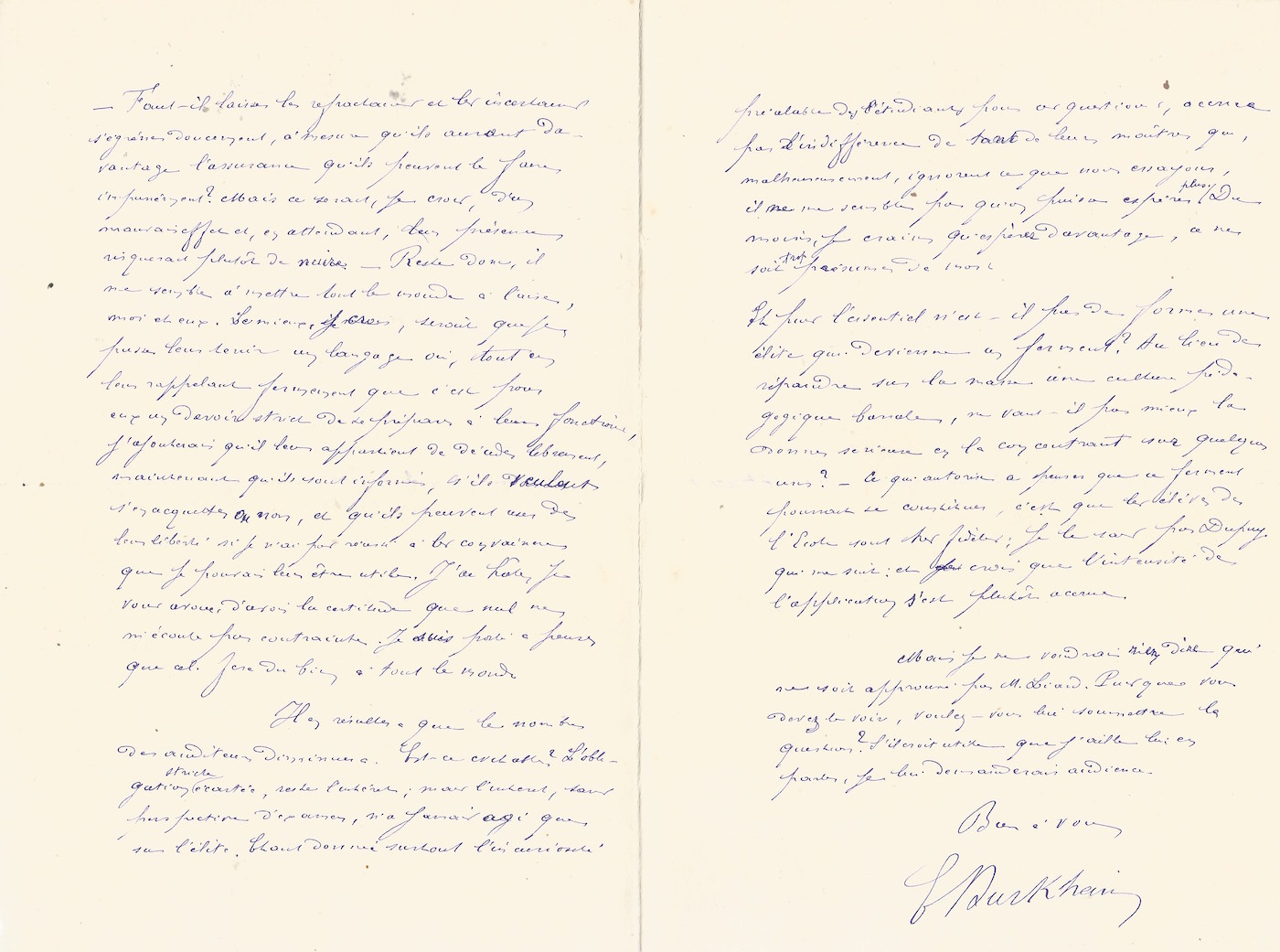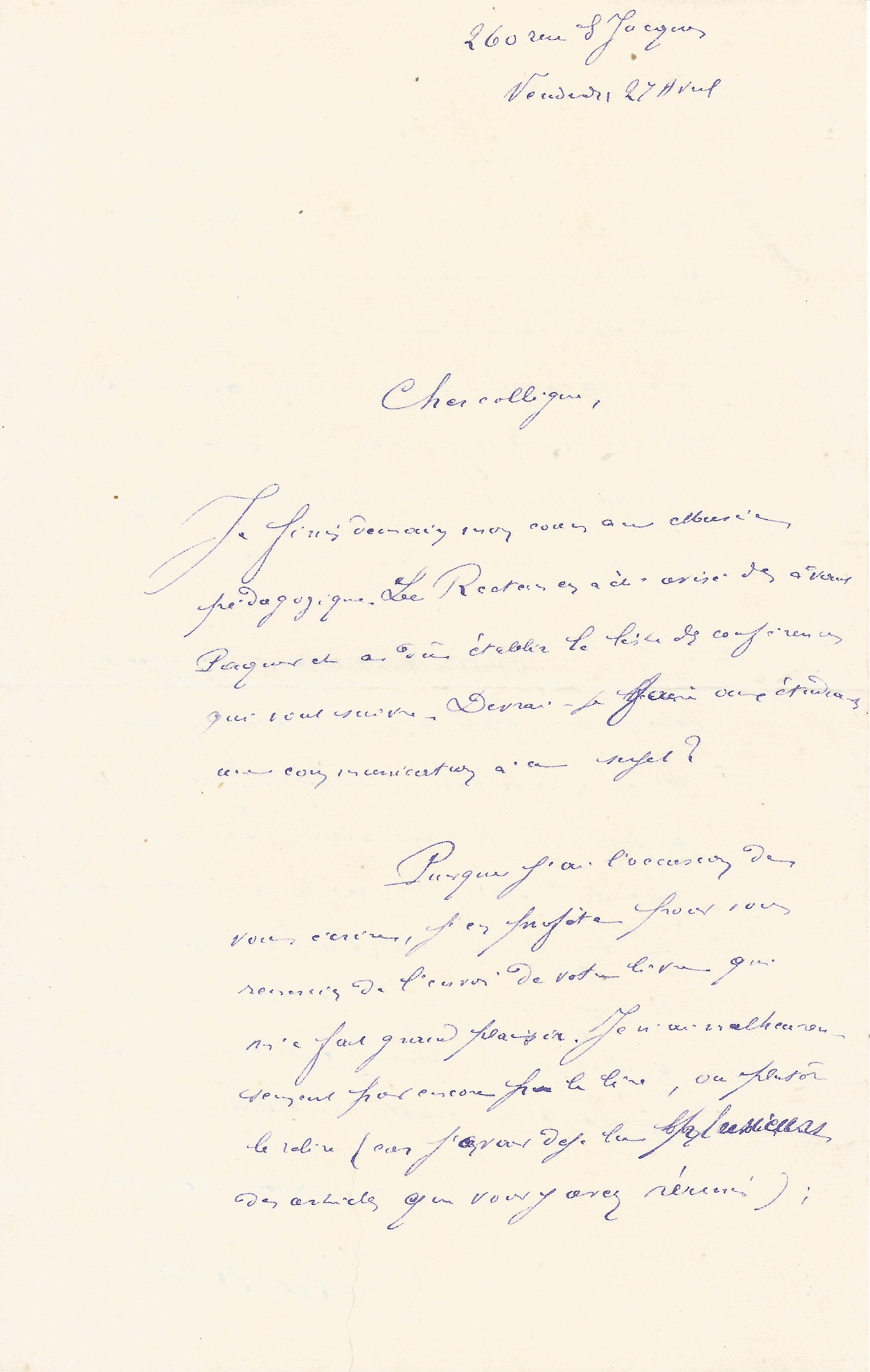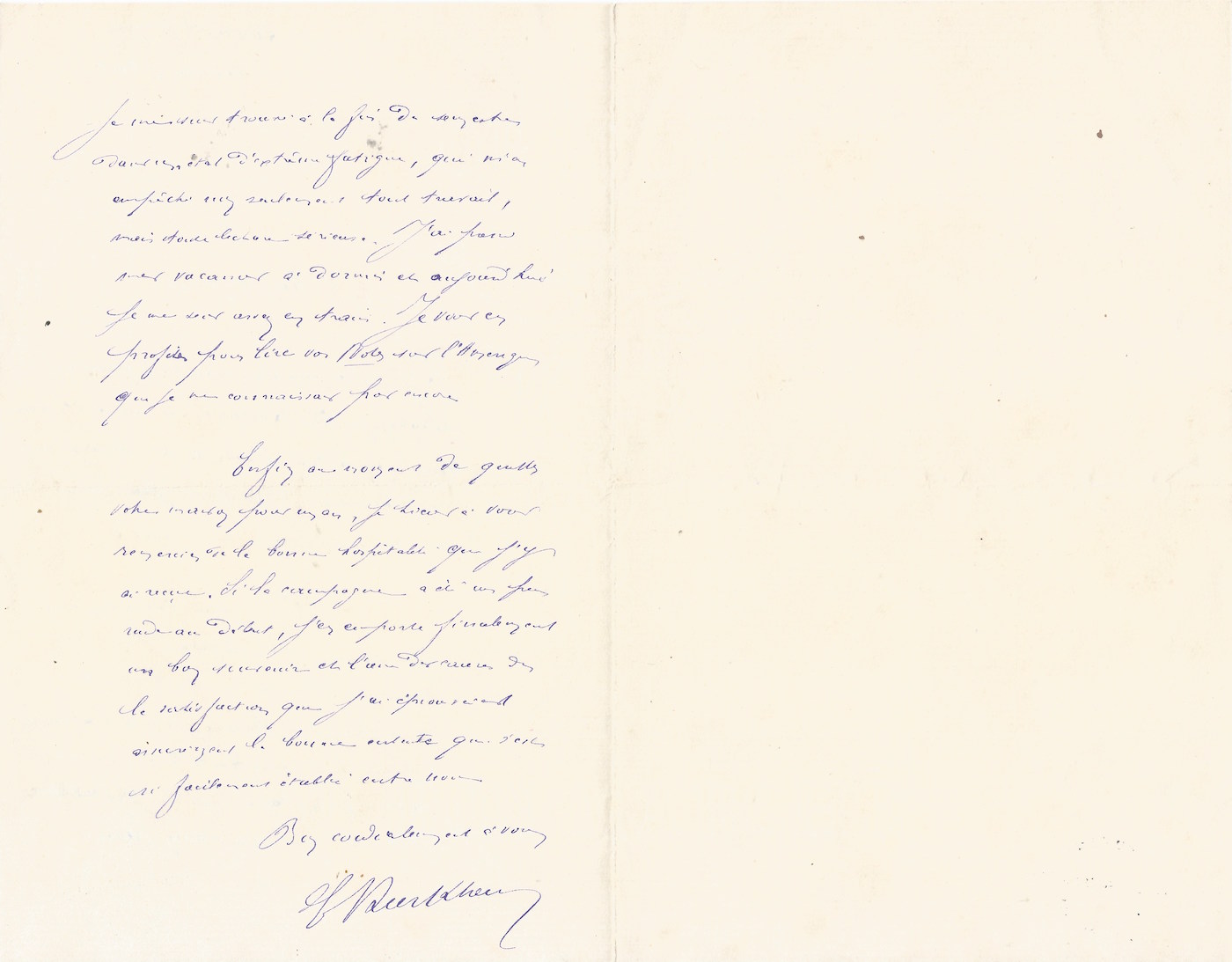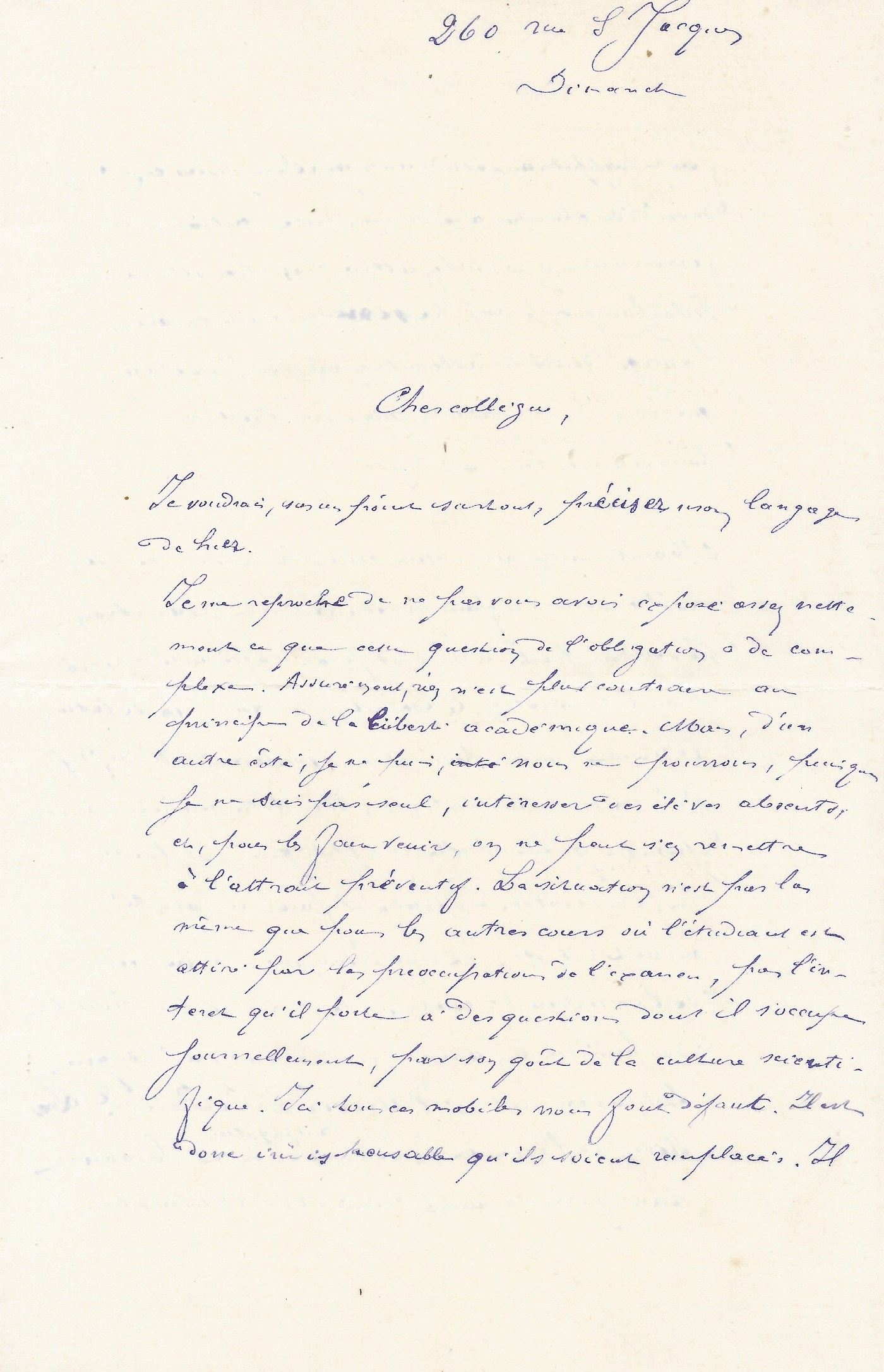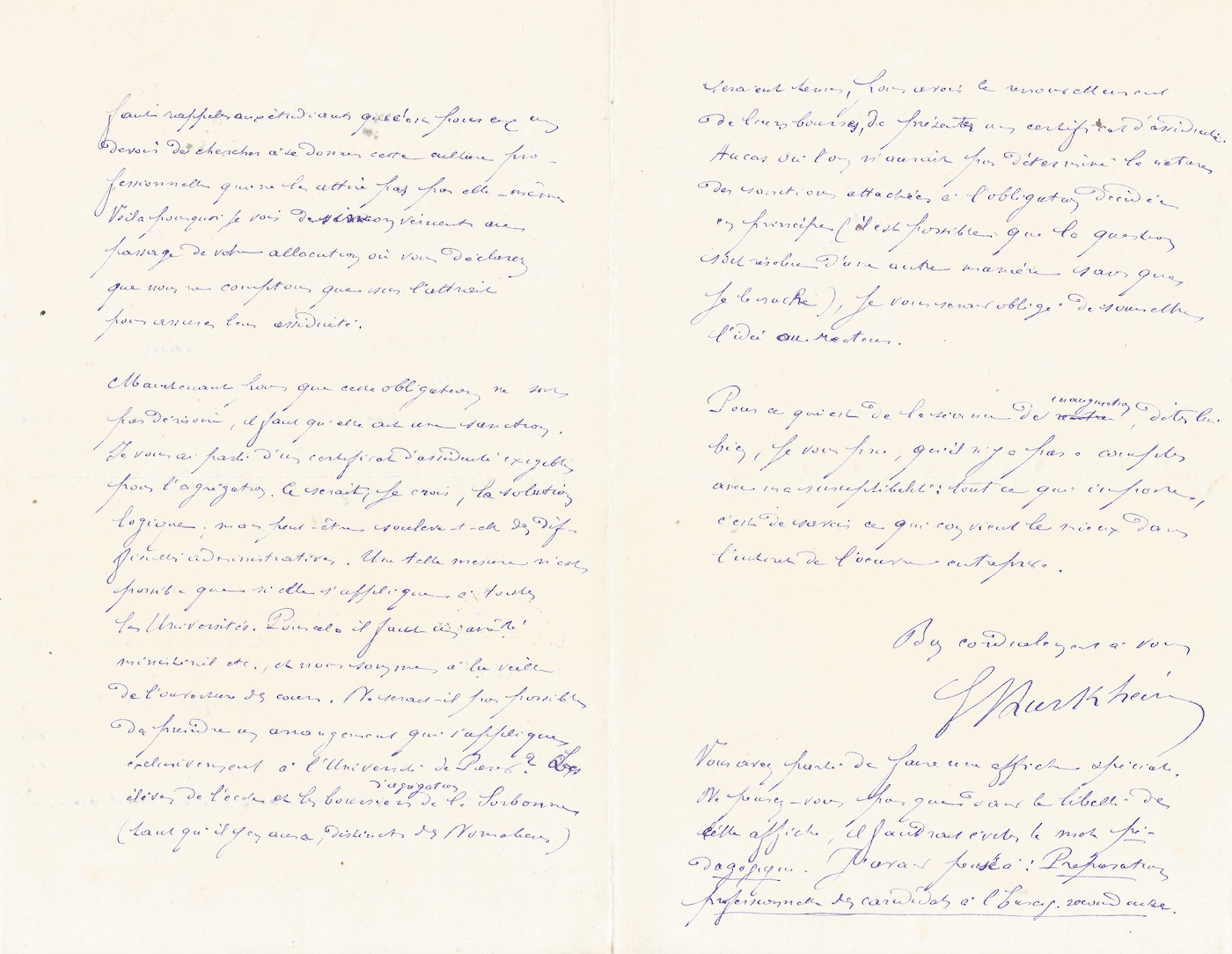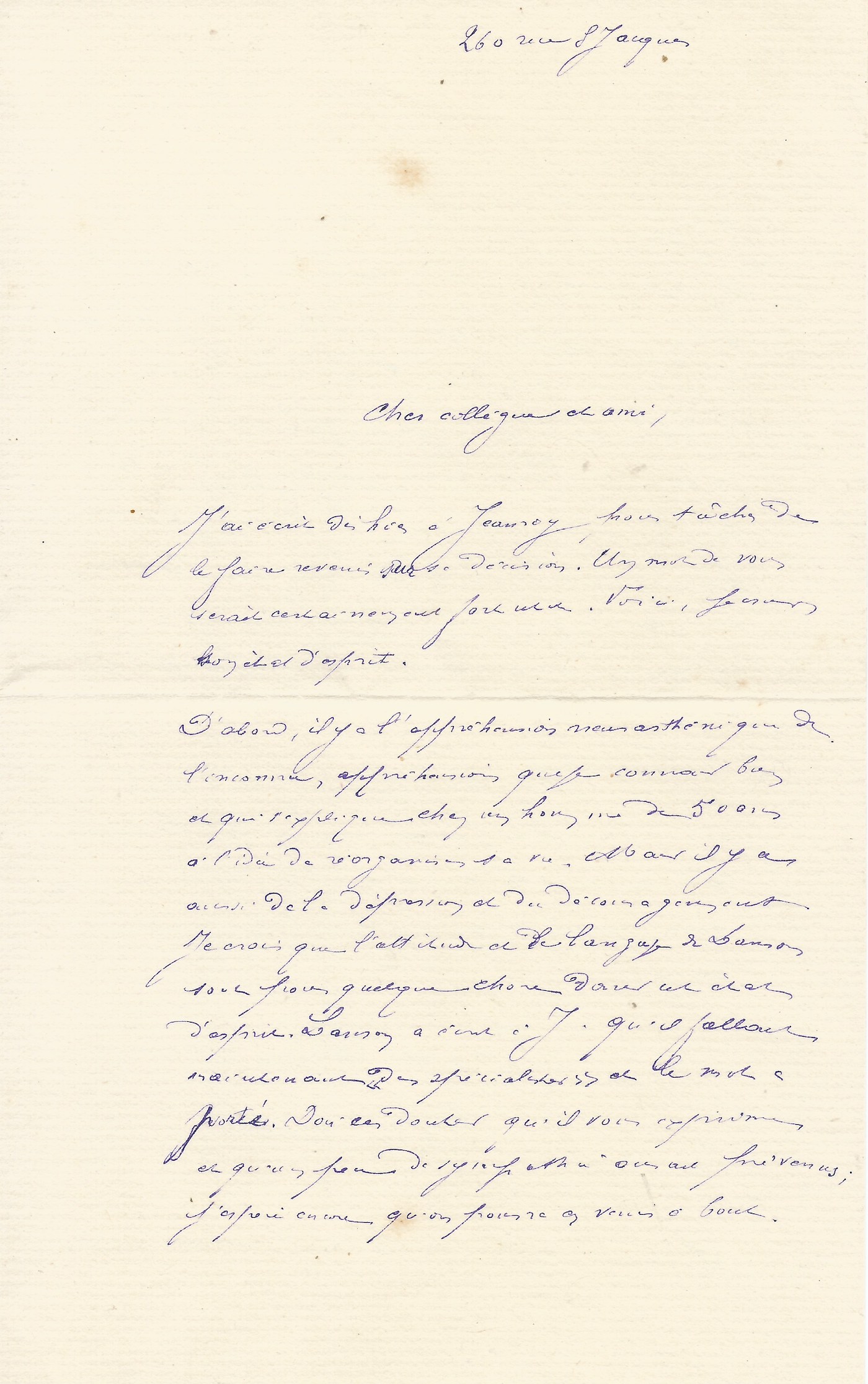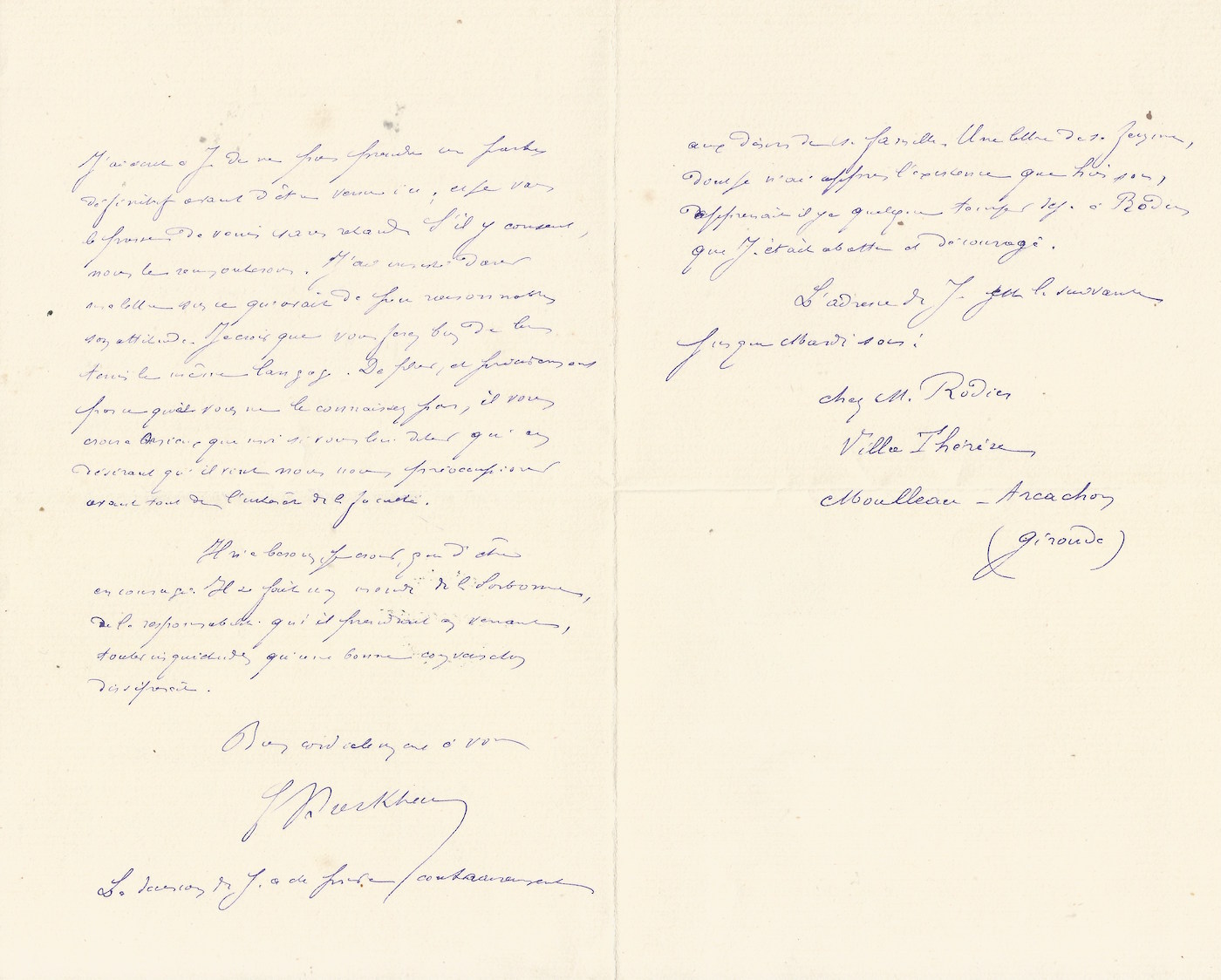Émile Durkheim (1858.1917)
Set of four autograph letters signed to Charles Victor Langlois.
Eleven octavo pages in total
Paris. Without dates.
“I can't wait, I confess, to have the certainty that no one listens to me out of coercion. »
Very interesting correspondence from Durkheim to his colleague, testifying to the sociologist's fierce commitment to defending the excellence of teaching at the Sorbonne.
_____________________________________________
Letter I. 260 rue St Jacques. Sunday. Undated.
“My dear colleague, I thank you for having postponed the draft register and send you the impressions that my third lesson left me. My feeling becomes clearer, along the way. The numerical decline that I had already noticed, perhaps from my first, in any case from my second lesson, continued yesterday. The number of those present did not exceed a hundred. So around fifty people immediately stopped coming, probably realizing that their presence was not controlled. Should we therefore institute control? But, as I have already told you, obligation without sanction will be ineffective; then the obligation to sign does not entail the obligation to stay, and this does not imply active attention, but would rather provoke an ill-grace which could only lower the moral temperature of the room.
Should we let the refractory and the uncertain slowly move on, as they become more confident that they can do so with impunity? But this would, I believe, have a bad effect and, while waiting for their presence, would rather doing harm. So it seems to me to put everyone at ease, me and them. The best, I believe, would be if I could speak to them in a language where, while firmly reminding them that it is a strict duty for them to prepare for their role, I would add that it is up to them to decide freely, now that they are informed, whether they want to fulfill it or not, and that they can use their freedom if I have not succeeded in convincing them that I could be useful to them. I can't wait, I confess, to have the certainty that no one listens to me out of coercion. I am inclined to think that this will be good for everyone.
As a result, the number of listeners will decrease. Strict obligation aside, interest remains; but interest, without perspective of examination, has only ever acted on the elite. Especially given the prior incuriosity of students regarding these questions, increased by the indifference of so many of their teachers who, unfortunately, are unaware of what we are trying, it does not seem to me that we can hope for more. At least, I fear that to hope for more would be to assume too much of myself.
In addition, isn't the main thing to form an elite who becomes a ferment? Instead of spreading a banal educational culture to the masses, isn't it better to make it serious by concentrating it on a few? What allows us to think that this ferment could be formed is that the elites of the School are very loyal? I know this from Dupuy who follows me, and I believe that the intensity of the application has rather increased. But I wouldn't want to say anything that wouldn't be approved by Mr. Liard. Since you have to see him, would you like to put the question to him? If he thinks it would be useful for me to talk to him about it, I will ask for an audience. »
Letter II. 260 rue St Jacques. Sunday. Undated.
“Dear colleague, I would like, on one point in particular, to clarify my language of yesterday. I blame myself for not having explained to you clearly enough the complexity of this question of obligation. Certainly, nothing is more contrary to the principle of academic freedom. But, on the other hand, I cannot, we cannot, since I am not alone, interest absent students, and for the days to come, nothing can be left to preventive attraction. The situation is not the same as for other courses where the student is attracted by the concerns of the exam, by the interest he has in questions that he deals with daily, by his taste for scientific culture. Here all these motives fail us. It is therefore essential that they be replaced. Students must be reminded that it is their duty to seek to establish this professional culture which does not attract them in itself. This is why I see drawbacks to the passage in your speech where you declare that we are only counting on attraction to ensure their attendance.
Now, for this obligation not to be derisory, it must have a sanction. I told you about a certificate of attendance required for aggregation. This would, I believe, be the logical solution; but perhaps it raises administrative difficulties. Such a measure is only possible if it applies to all Universities. For this, a ministerial decree etc. is required, and we are on the eve of the opening of classes. Would it not be possible to make an arrangement that applies exclusively to the University of Paris? Students of the school and Sorbonne aggregation scholarship holders (as long as there are any, distinct from Normaliens) would be required, to have their scholarships renewed, to present a certificate of attendance. In the event that the nature of the sanctions attached to the obligation decided in principle has not been determined (it is possible that the question will be resolved in another way without my knowledge), I would be obliged to submit the idea to the rector.
As for the inauguration session, please tell him that there is no need to put up with my susceptibility; all that matters is knowing what is best in the interests of the work undertaken. Best regards. E. Durkheim. You talked about making a special poster. Don't you think that in the wording of this poster, the word pedagogical . I had thought about: Professional preparation of candidates for Enseig. secondary . »
Letter III. 260 rue St Jacques. Friday April 27. Undated.
“My dear colleague, I am finishing my course tomorrow at the educational museum. The rector was informed of this before Easter and had to draw up the list of conferences which will follow. Will I have to communicate to students about this? Since I have the opportunity to write to you, I would like to take this opportunity to thank you for sending your book which gave me great pleasure. Unfortunately I have not yet been able to read it, or rather re-read it having already read it in several of the articles that you have brought together.
I found myself […] in a state of extreme fatigue, which prevented me not only from any work, but from any serious reading. I spent my vacation sleeping and today I'm feeling pretty energetic. I will take the opportunity to read your notes on [?] which I did not yet know […]. I would like to thank you for the good hospitality I received there. If the campaign was a little rough at the beginning, I ultimately bring back good memories of it and one of the causes of the satisfaction I experienced is sincerely the good understanding that was so easily established between us. »
Letter IV. 260 rue St Jacques. Undated.
[Alfred Jeanroy] yesterday to try to get him to reconsider his decision. A word from you would certainly be very useful. This, I believe, is his state of mind. First, there is the neurasthenic apprehension of the unknown, an apprehension that I know well and which is understandable in a 50-year-old man at the idea of reorganizing his life. But there is also depression and discouragement. I believe that Lanson's attitude and language [Gustave Lanson, professor of French eloquence at the Sorbonne.] have something to do with this state of mind. Lanson wrote to J. that “specialties” were now needed and the word spread. Hence these doubts that he expresses to you and which a little sympathy would have prevented; I still hope that we can overcome this.
I wrote to J. not to take a definitive decision before coming here; and I will urge him to come without delay, if he agrees, we will meet him. I insisted in my letter on the unreasonableness of his attitude. I think you would do well to speak the same language to him. Furthermore, and fortunately because you don't know him, he will believe you better than me if you tell him that in wanting him to stay we were primarily concerned with the interests of the faculty. He only needs, I believe, to be encouraged. He imagines the Sorbonne, the responsibility he would take upon coming, all the worries that a good conversation would dissipate. »
_____________________________________________
Following his thesis defended in 1893 on The division of social labor , Emile Durkheim was appointed to the University of Bordeaux, then in 1902 to the Sorbonne, to a chair of educational science. It was only in 1913 that his chair took the title of “educational science and sociology”.
Durkheim's commitment had a decisive influence on the educational policy of the Third Republic. He taught continuously at the Sorbonne from 1904 and 1912. His courses were published after his death under the title L'Évolution pedagogique en France.
The historian Charles-Victor Langlois (1863.1929) was a professor at the Sorbonne from 1888. He became an assistant professor in 1901, then professor of auxiliary sciences of history from 1906 to 1909 and finally professor of Middle Ages history from 1909 to 1913.

